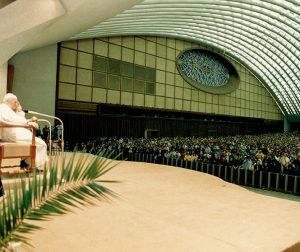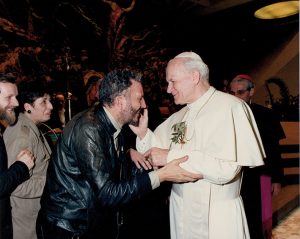Audience with the youth of the Neocatechumenal Way March 27, 1988
St. John Paul II

Palm Sunday – Rome, March 27, 1988 *
About ten thousand young people have participated in a meeting promoted by the Neocatechumenal Way. Gathered during the afternoon of Palm Sunday in the Hall of Paul VI of the Vatican, they have been praying while waiting for the arrival of the Holy Father. After twenty years of deep crisis, vocations are reappearing in the Catholic Church. A sign of this process was seen yesterday in the course of a meeting of twelve thousand cantors and young people from the Neocatechumenal Communities with the Holy Father that took place in the Hall of Paul VI of the Vatican on the occasion of Palm Sunday.
While they waited for the visit of the Holy Father, Kiko Argüello, one of the initiators of the Neocatechumenal Way, together with Carmen Hernández and Father Mario Pezzi, rehearsed with those present the songs for the Triduum and the Pascual Vigil which the Neocatechumens celebrate the whole night and which they feel is the axis of all baptismal spirituality. After the entrance of the Holy Father, a large life-size wood sculptor of Christ Crucified, a gift from the communities of Ecuador, accompanied by the palm branches has been carried by the seminarians of the “Redemptoris Mater” Seminary of Rome and was carried in procession to preside over the meeting. “Carry the crucified Christ into the world,” said Kiko in front of the Pope, “it is a good news, it is not an example of oppression or masochism. The world wants to suppress the crucifix today and lives terrified of any kind of suffering. Christ has opened a way through death. We suffer because we do not love the other in this way, giving ourselves totally to the other. Is it possible to love like this? Yes, because He gives his nature, from Heaven sends us his Holy Spirit who has conquered death and creates eternal life in us, a new life that allows us to love the other beyond death, with all the defects of the other. To love like this is happiness. How can we not bring this water to the desert that is the world of today?” Kiko then invited those who had already felt or who now feel the call to the priesthood or to the contemplative life to stand up. Sixty-five young people went to kneel at the foot of the Holy Father: forty young men to enter the seminary and twenty-five young women to enter cloistered convents.
It is surprising to see this flourishing of vocations. In the last three years, more than two thousand young people from the Neocatechumenal Communities have entered various seminaries throughout the world to prepare for the priesthood. In Rome a diocesan seminary, the “Redemptoris Mater” has been opened to form priests for the New Evangelization called for by John Paul II. These future priests, without forming a congregation, but belonging to their dioceses and supported by their own communities, will leave with the families who have finished the time of catechumenal formation and who, by the hundreds, have offered to go to evangelize in the poorest areas and most de-christianized in the world. These are the Pope’s words:
«We have begun Holy Week today with Palm Sunday and, at the same time, we have celebrated the third World Youth Day. This day, in St. Peter’s Square, we have celebrated one and the other. I am very happy to be among you, young people: to find myself singing because this is a day of song: “Pueri hebraeorum portantes ramos olivarum …” We know this antiphon of Palm Sunday well. It is a day for you young people; to sing: “Hosanna! Blessed is he who comes in the name of the Lord!” It is a day characterized by the announcement of the prophets. But we know well that within this exultant and joyful celebration of the Palms, the Church leads us by the hand to the Passion of Christ. This transitory joy hides and covers within itself the mystery of the Passion and of the Cross, as is the Pascual Mystery. On this day, you have gathered not only to sing like the youth of Jerusalem, but also to discover the figure of the crucified, of Jesus, who is dying on the cross. You have meditated and prayed. Entering into the mystery of Palm Sunday, the mystery of the Passion of Christ, of his Cross and of his Resurrection, you also think of the Church and the mission of the Church, because Christ is dead on the cross to give new life to humanity.

The Church, as the Holy Fathers say, was founded, above all, in the moment of his death; from his side burst forth our salvation. Symbolically a new reality opens up, a new divine mission that embraces humanity. The Church is born, which, as the Second Vatican Council says, is “in Christ as a sacrament … of intimate union with God and of the unity of all mankind” (L.G.1). Jesus prepared his disciples for this pascual moment. In fact, after his resurrection, with his hands, feet and side pierced, he will present himself to his disciples to give them the Holy Spirit and to announce to them the mission that awaits them, awaits this new Israel, of which the apostles are the beginning and the foreshadowing.
The Church thus begins to fulfill its mission and becomes missionary. If we think seriously about the pascual mystery of Christ, we cannot separate the Church from its mystery and its mission. You, here, reflect on the mission of the Church throughout the world. This mission needs missionaries, it needs apostles. Missionaries continue the mission of the apostles. The Second Vatican Council tells us that the whole Church is missionary by nature. Missionary means apostolic; means sent. You are living this moment of the call and of the mission of the call and of the mission of the Church that is made up of various charisms and ministries. The unique mission of the Church emerges, especially today, from the base of the lay apostolate. But for the Church and for its mission, priestly and religious vocations are needed. I have seen here some young people who have come forward spontaneously to say to this assembly: “Here I am, I am going.” I have immediately thought that this offering could not be made if not before God, but if it is made before men, it is made especially before the family. You are a family. If these decisions can be made like this, spontaneously, under the power of the Spirit, this means that you are a family. If, in fact, a young man or a young woman can appear before everyone and say to the crucified Christ: “Here I am, I am yours”, it means that God loves you, that God calls you. I am very aware, deeply aware of the grace of the priestly vocation and of the religious vocation. It is a grace for those called, but at the same time it is a grace for the community, for the Church, for its mission and for its stability.
If the Church, as the Second Vatican Council reminds us, is a priestly people, if all the faithful have in common a baptismal priesthood, then you can see the need for those who are called to the priesthood to raise awareness of the shared priesthood of all and to express this priestly characteristic of all and then to serve. The priesthood is a very important ministry. We know this, even by the negative and painful experience of the lack of priestly and religious vocations. The Church cannot be herself if she is not aspiring to this Kingdom of heaven, even more, anticipating this Kingdom to the faithful already from down here, from the earth. People, men and women, must be able to follow the poor Christ, the virgin Christ, the obedient Christ until death. It is about the fundamental, essential, constitutive dimensions of the Church.
When you have priestly and religious vocations, there is proof of the catholicity of the local churches and parishes, as well as Christian families. Once upon a time, and perhaps also now, families boasted of having priests among their sons and consecrated daughters. The family is the domestic Church, a living cell and a life-giving Church.
I have told you what I had in my heart. I am grateful to parents, families, and communities capable of growing and maturing vocations always and everywhere. I am grateful to your family and your community that concerns itself with raising, growing and maturing vocations. Our crucified and risen Lord bless this vocational work of your great family that grows from day to day. May the Lord give you all a courageous and deep Christian vocation; to the spouses, the matrimonial vocation, conjugal, family of parents and educators. To those who feel another call within, the ability to follow the priestly or religious vocation, welcoming this gift of the Spirit that comes always from the pierced heart of Our Savior who is hanging on the cross.»
(*) Cfr. «Avvenire», 29 marzo 1988 e «L’Osservatore Romano», 28-29 marzo 1988.